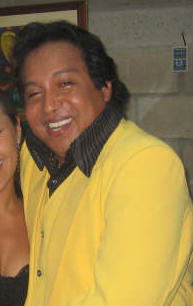Luis Rodriguez may refer to:
Pérez or Perez, as most commonly written in English, is a Castilian Spanish surname. Peretz or Perets is also common among people of Sephardi Jewish descent, and is the 4th most common surname in Israel, most common surname not of Hebrew language origin, and most common surname exclusive to a single Jewish ethnoreligious subgroup.
Miguel is a given name and surname, the Portuguese and Spanish form of the Hebrew name Michael. It may refer to:
Díaz is a common surname of Spanish origin with multiple meanings in multiple languages. First found in the Kingdom of Castile, where the name originated in the Visigoth period, the name accounts for about 0.17% of the Spanish population, ranking as the 14th-most frequently found surname in both 1999 and 2004.
Esperanza is the Spanish word for hope, and may refer to:
Morales is a Spanish surname. Notable people with the surname include:
Juan is a given name, the Spanish and Manx versions of John. The name is of Hebrew origin and has the meaning "God has been gracious." It is very common in Spain and in other Spanish-speaking countries around the world and in the Philippines, and also in the Isle of Man. The name is becoming popular around the world and can be pronounced differently according that region. In Spanish, the diminutive form is Juanito, with feminine form Juana, and feminine diminutive Juanita.
Rodríguez is a Spanish patronymic and a common surname in Spain, Latin America. Its Portuguese equivalent is Rodrigues.

Diomedes Díaz Maestre was a Colombian vallenato singer, songwriter, and composer. His nickname, "El Cacique de la Junta", was given to him by another vallenato singer, Rafael Orozco Maestre, in honor of Díaz's birthplace.
Guerra is a Portuguese, Spanish and Italian term meaning "war". Notable people with the surname Guerra include:
La Prensa is a frequently used name for newspapers in the Spanish-speaking world. It may refer to:
Latin American literature consists of the oral and written literature of Latin America in several languages, particularly in Spanish, Portuguese, and the indigenous languages of the Americas. It rose to particular prominence globally during the second half of the 20th century, largely due to the international success of the style known as magical realism. As such, the region's literature is often associated solely with this style, with the 20th century literary movement known as Latin American Boom, and with its most famous exponent, Gabriel García Márquez. Latin American literature has a rich and complex tradition of literary production that dates back many centuries.
Escobar is a Spanish surname. Notable people with the surname include:

Martínez is a common surname in the Spanish language. Martínez is the most common surname in the Spanish regions of Navarre, La Rioja, Cuenca and Murcia. There are also variations such as San Martin and Martín.

Rojas is a surname found throughout the Spanish-speaking world, especially in Latin America.
Bogotá39 was a collaborative project between the Hay Festival and Bogotá: UNESCO World Book Capital City 2007 in order to identify 39 of the most promising Latin American writers under the age of 39. The judges for the contest were three Colombian writers: Piedad Bonnett, Héctor Abad Faciolince and Óscar Collazos. The success of this project led to a similar project two years later called Beirut39, which selected 39 of the most promising writers from the Arab world. Africa39 followed in 2014.
Germán is a male given name in Spanish speaking countries. It is a cognate to French Germain, and is a variant of Latin Germanus.

Herrera is a surname of Spanish origin, from the Latin word ferrāria, meaning "iron mine" or "iron works" and also the feminine of Latin ferrārius, "of or pertaining to iron"; or, alternatively, the feminine of Spanish herrero, which also gives the surname Herrero. Variants of the name include Errera, Ferrera and the less common Bherrera. Its equivalent in Portuguese and Galician is Ferreira. Also, because of Spanish naming customs, some people are listed here with their family name as their second-to-last name.

The following is a list of events and releases that happened in 2018 in Latin music. The list covers events and releases from Latin regions including Spanish- and Portuguese-speaking areas of Latin America, Spain, Portugal, and the United States.
This page is based on this
Wikipedia article Text is available under the
CC BY-SA 4.0 license; additional terms may apply.
Images, videos and audio are available under their respective licenses.




